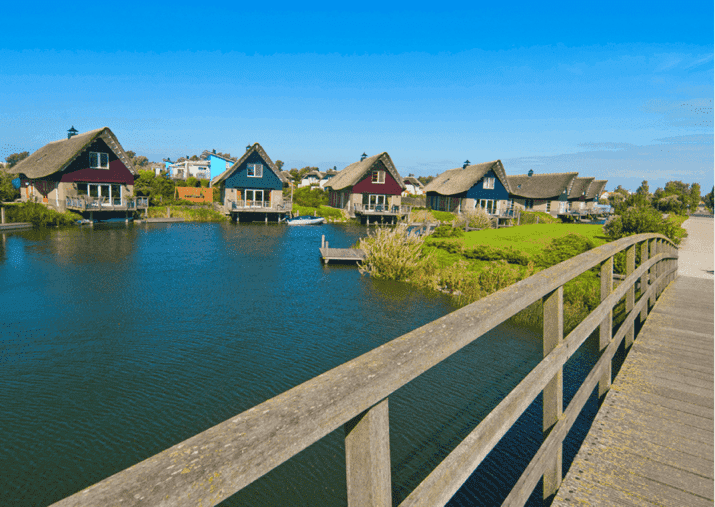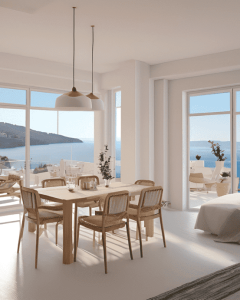Shocking Stats: Vacation Home Demand in the U.S. Hits Lowest Point in 7 Years
Mortgage rate locks for second homes in the U.S. have seen a significant decline, with figures down by nearly 50% compared to pre-pandemic levels, according to recent data. This marks the 14th consecutive month in which second-home demand has remained below pre-pandemic levels.
Mortgage rate locks for second homes in the U.S. have seen a significant decline, with figures down by nearly 50% compared to pre-pandemic levels, according to recent data from Redfin. In August, rate locks for second homes decreased by 47% on a seasonally adjusted basis, while the decline for primary homes was 33%. This marks the 14th consecutive month in which second-home demand has remained at least 30% below pre-pandemic levels, mainly due to high housing costs and limited inventory that discourage potential buyers.
During the month of February, rate locks for second homes reached a seven-year low, plummeting to 52% below pre-pandemic levels. For those unfamiliar with the term, a mortgage rate lock is an agreement between a buyer and a lender that allows the buyer to secure an interest rate for a specific duration of time. Approximately 80% of rate locks ultimately result in home purchases.
Furthermore, the year-over-year demand for second homes has also seen a decline. Rate locks for second homes have fallen by 19% compared to a 14% decrease for primary homes. This decline follows a surge in mortgage locks for vacation properties during the pandemic, reaching an all-time high of 88.5% above pre-pandemic levels in October 2020. Affluent Americans took advantage of historically low mortgage rates and the ability to work remotely from vacation destinations, leading to a sharp increase in second-home purchases. Primary homes also experienced increased demand but to a lesser extent, reaching a peak of 16% above pre-pandemic levels in late 2020.
The decrease in mortgage locks for vacation homes can be attributed to various factors. Firstly, the cost of purchasing a second home has risen significantly. The average home in a seasonal town, often where second homes are situated, now sells for $564,000, reflecting a 5% increase compared to the previous year. In contrast, homes in non-seasonal towns have also seen a 5% increase but have a lower median price of $421,000. Additionally, mortgage rates for second homes are usually higher than those for primary residences. Furthermore, the federal government implemented higher loan fees for second homes in 2022, resulting in additional costs of tens of thousands of dollars for potential buyers.
The waning appeal of second homes can also be attributed to the shift in remote work culture. Many companies have begun requiring employees to return to the office, at least on a part-time basis. This change has diminished the allure of owning a second home located in a vacation destination. Moreover, the attractiveness of purchasing a vacation property to be used as a short-term rental, such as on Airbnb, has diminished due to new regulations imposed by local governments. In places like New York City, stricter permitting and increased taxes have significantly cut into potential rental profits, making the business less lucrative for owners.
Furthermore, the long-term rental market has become less appealing for second-home buyers as well. Although rental prices remain high, many landlords are now offering concessions to attract tenants and fill vacancies. Additionally, there is an anticipated influx of new rental units hitting the market soon, creating more options for renters.
In conclusion, the mortgage rate locks for second homes in the U.S. have experienced a notable decrease, reaching a level that is nearly 50% below pre-pandemic levels. This decline can be attributed to high housing costs, limited inventory, increased loan fees, the return to office work, and diminishing attractiveness of short-term and long-term rentals. As a result, demand for second homes has been significantly impacted.
Shocking Stats: Vacation Home Demand in the U.S. Hits Lowest Point in 7 Years
Greece Real Estate Market: Rise of Serviced Apartments
Explore the growing demand for serviced apartments in central Athens, where integrated hospitality services attract savvy investors in the Greece real estate market.
Explore the growing demand for serviced apartments in central Athens, where integrated hospitality services attract savvy investors in the Greece real estate market.
Read moreHome Prices Hit by Climate Change, J.P. Morgan Warns
J.P. Morgan analysts reveal a negative link between climate risk and home price appreciation. Explore the emerging trends and their impact.
J.P. Morgan analysts reveal a negative link between climate risk and home price appreciation. Explore the emerging trends and their impact.
Read moreRenting in Spain: Prices Finally Decline
The cost of renting in Spain trends downwards, averaging €13/m². Discover insights on this shift after years of steep increases.
The cost of renting in Spain trends downwards, averaging €13/m². Discover insights on this shift after years of steep increases.
Read moreRise of Cash Purchases Outside London: A New Trend
Explore the growing trend of cash purchases outside London and its implications for the property market and economic landscape.
Explore the growing trend of cash purchases outside London and its implications for the property market and economic landscape.
Read moreCanada Real Estate Market: Rents Drop for First Time in over 3 years
For the first time in over three years, average asking rents in Canada fell 1.2% in October, reaching $2,152, according to Rentals.ca.
For the first time in over three years, average asking rents in Canada fell 1.2% in October, reaching $2,152, according to Rentals.ca.
Read moreFewer Than 2% of Dutch Homes Sold to International Buyers
Analyze the decline in international purchases of Dutch houses, revealing key factors influencing this trend and its effects on the housing market.
Analyze the decline in international purchases of Dutch houses, revealing key factors influencing this trend and its effects on the housing market.
Read moreDonald Trump’s Victory May Boost London Property Demand
Knight Frank analyzes how Donald Trump’s election win could increase demand for prime London properties. Discover the potential market shifts.
Knight Frank analyzes how Donald Trump’s election win could increase demand for prime London properties. Discover the potential market shifts.
Read moreGerman Investors Fuel Growth in Greek Real Estate Market
Discover how German-speaking house buyers are revitalizing Greece's realty market, driving demand and investment in stunning properties.
Discover how German-speaking house buyers are revitalizing Greece\'s realty market, driving demand and investment in stunning properties.
Read moreLisbon: 11th City for Rising Luxury House Prices
Lisbon's luxury housing prices increased by 5.6%, outpacing Madrid, Seoul, and Zurich, marking it as a key player in the global real estate market.
Lisbon\'s luxury housing prices increased by 5.6%, outpacing Madrid, Seoul, and Zurich, marking it as a key player in the global real estate market.
Read more














